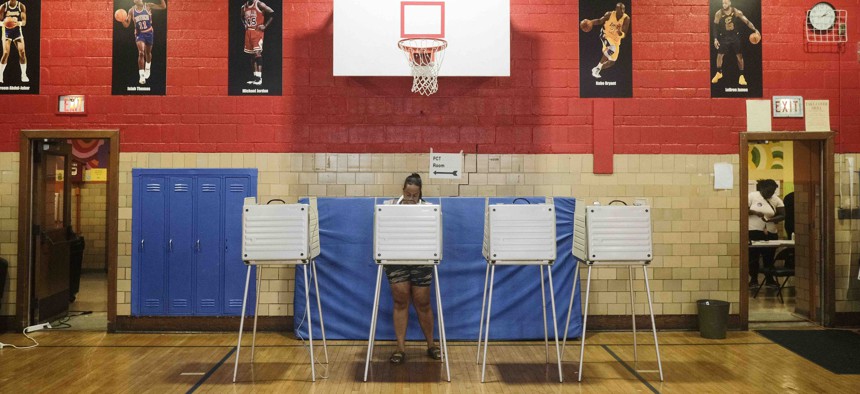Republican Election Deniers Rack Up State Level Primary Wins

Michigan residents their ballots in the Michigan primary election on August 2, 2022 in Bloomfield Hills, Michigan. Matthew Hatcher/Getty Images
Former President Trump's clout in state elections was on display this week. In Arizona, his picks for governor and five seats in the legislature won their primaries. In Michigan, five of 10 Trump-endorsed legislative candidates on the ballot prevailed.
Republicans who have amplified former President Trump's false conspiracies about the 2020 election won primaries this week for secretary of state and governor in Michigan and Arizona, putting them in position to undermine future elections in two pivotal battlegrounds.
"If any one of these election deniers wins statewide office and gets to oversee our votes, it will be a five-alarm fire for our elections," tweeted Joanna Lydgate, CEO of States United Action, which works with state and local officials to preserve and strengthen democracy. "Voters have the power in November. Our free and fair elections are on the line."
Election-deniers also did well in down-ballot races. In Arizona, all five Trump picks for seats in the state legislature won their primaries Tuesday. In Michigan, five of the 10 Trump-endorsed legislative candidates on the primary ballot emerged victorious. (According to Ballotpedia, Trump declared his support for 24 statehouse candidates in total, including six in Texas, two in Wisconsin and one in Florida, in addition to Michigan and Arizona.)
On Thursday, Kari Lake, the Trump-backed GOP candidate for governor in Arizona clinched the primary nomination there against Karrin Taylor Robson, who drew support from Arizona's current Republican governor Doug Ducey and Trump's vice president, Mike Pence. Lake will now face off against Arizona Secretary of State Katie Hobbs, a Democrat, in November.
“Arizonans who have been forgotten by the establishment just delivered a political earthquake,” Lake said in a statement.
From seeking to pass laws that limit voter access to promising to manipulate election results, Trump-backed Republicans at the state level have become the former president’s trusted allies in a fight that threatens to undermine democracy.
“Since the 2020 election, voting legislation has taken on new importance in state legislatures across the country,’’ according to the Brennan Center for Justice. “Starting in 2021 and continuing into this year, lawmakers have aggressively attempted to limit voting access and roll back the gains of an election conducted during the deadly Covid-19 pandemic.”
The Brennan Center, a public policy institute dedicated to defending democracy, says six states have enacted nine election interference laws and two states have enacted two laws that restrict access to the vote. Overall, at least 393 restrictive voting bills have been proposed in 39 state legislatures.
Like their Republican primary opponents, the candidates supported by Trump campaigned on a conservative agenda, from opposition to abortion and gun control to support for a border wall.
But it was their embrace of false theories about the 2020 election that appeared to tip the balance and win them Trump’s backing, a coveted prize in a Republican primary.
“Trump's interventions have really been almost singularly about…the 2020 election,’’ said Matt Grossmann, a professor of American politics at Michigan State University.
“It’s been pretty transparent that’s why he’s chosen to intervene in some races and against some incumbents,” he added.
A review of Trump’s legislative endorsements reveals a pattern: he repeatedly stoked fears about “election integrity” and made false allegations about widespread voter fraud.
In a November email endorsing Arizona Senate candidate Anthony Kern, Trump says Kern is “an incredible fighter for election integrity and will bring back honesty to our voting system.”
Kern, who won Tuesday’s primary in a suburban Phoenix district, supports decertifying the 2020 presidential results and attended Trump’s Jan. 6 rally prior to the assault on the U.S. Capitol.
Trump also praised Mike Hoadley, an Army veteran who entered the race for a seat in the Michigan House of Representatives because he saw “the greatest crime in American history–the theft of the 2020 presidential election.” Hoadley won on Tuesday.
The former president held grudges against Republican state lawmakers who rejected his lies about the 2020 contest. That was evident in his campaign to defeat Rusty Bowers, the Republican speaker of the Arizona House.
Bowers became a Trump target after he refused to yield to the former president's pressure to illegally overturn Joe Biden’s victory in Arizona. Bowers, who testified before the Congressional committee investigating the Jan. 6 insurrection, also was censured last month by the state Republican Party.
Trump called Bowers “a weak and pathetic RINO who has blocked election integrity, allowed illegals to pour into Arizona, and betrayed the people of his Great State.” He endorsed Bowers’ opponent, David Farnsworth, who won the race.
Ousting a powerful Republican is a feat Trump hopes to repeat next week in Wisconsin. Trump has railed against Robin Vos, the powerful assembly speaker who also rejected Trump’s aggressive push to overturn the state’s election results.
This week, Trump endorsed Vos’ Republican opponent, Adam Steen.





